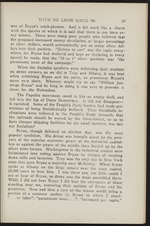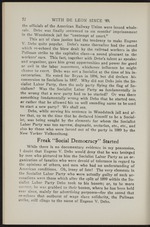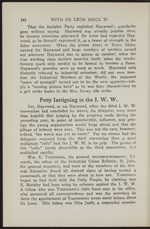| 1 |
 |
“...Nebraskan.
The Populist movement caved in like an empty shell, and
fell into the lap of Dame Democracy. It did not disappear
It vanished. Some of the Peoples Party leaders had made pre-
tensions of being Socialistically inclined. Their Socialistic In-
clinations were reflected in the Peoples Party demands that
t^he railroads should be owned by the Government, so as to
have cheaper shipping facilities for the small farmers; was this
not Socialism?
Bryan, though defeated on election day, was the most
popular candidate. His defeat was brought about by the pres-
sure of the superior economic power of the industrial capital-
ists as against the power of the middle class backed up by the
silver mine barons. Workingmen in the industrial centers were
intimidated into voting against Bryan by threats of shutting
down mills and factories. Troy was the only city in New York
state that gave Bryan a majority over McKinley. When Bryan
tate capitol,
20,000 came to hear him. I was there too. but little could I...”
|
|
| 2 |
 |
“...WITH DE LEON SINCE 89.
the officials of the American Railway Union were issued whole-
sale. Debs was finally sentenced to six months imprisonment
in the Woodstock jail for contempt of court.
This act of class justice had the tendency to make Eugene
V. Debs quite popular. Debss name thereafter had the sound
which re-echoed the blow dealt by the railroad workers in the
Pullman strike to the capitalist classa sound pleasant to the
workers ears. This fact, together with Debss talent as speaker
and organizer, gave him great opportunities and power for good
or evil in the labor movement, whichever influence he might
choose to exert. Debs was not a Socialist at the time of his in-
carceration. He voted for Bryan in 1896, but did declare his
conversion to Socialism in 1897. Why did not Debs join the So-
cialist Labor Party, then the only party flying the flag of So-
cialism? Was the Socialist Labor Party so fundamentally in
the wrong that a new party had to be started? Or was there
something f...”
|
|
| 3 |
 |
“...142 WITH DE LEON SINCE 89.
That the Socialist Party exploited Haywoods popularity
goes without saying. Haywood was actually popular then;
he became notorious afterward. De Leon had regarded Hay-
wood, as he himself expressed it, as a tower of strength in the
labor movement. When the prison doors in Boise, Idaho,
opened for Haywood and large numbers of workers turned
out wherever Haywood was to appear as speaker; when the
true working class instinct asserted itself; when the revolu-
tionary spark only needed to be fanned to become a flame,
Haywoods speeches were as weak as mush. Haywood only
distantly referred to industrial unionism; did not even men-
tion the Industrial Workers of the World; the supposed
tower of strength turned out to be the very oppositesim-
ply a "moving picture hero as he was later characterized by
a girl strike leader in the New Jersey silk strike.
Petty Intriguing in the I. W. W.
Yet, Haywood, or no Haywood, when the third I. W. W.
convention had concluded its labors...”
|
|
